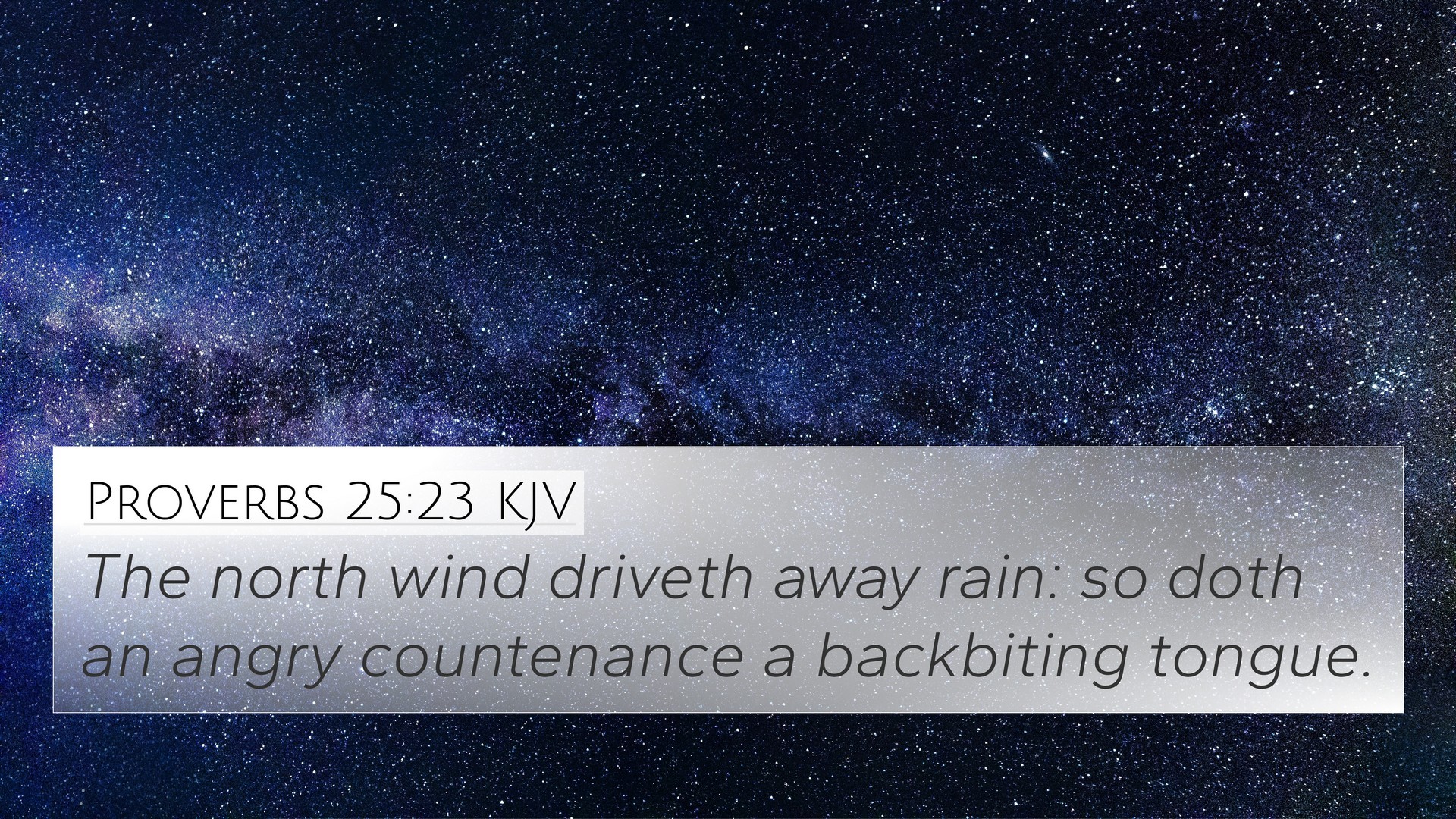Meaning of Proverbs 25:23
This verse from the book of Proverbs offers profound insights about the nature of communication and criticism. Let's delve into the interpretations provided by renowned Bible commentaries.
Text of the Verse
Proverbs 25:23: "The north wind brings forth rain: so doth a backbiting tongue an angry countenance."
Interpretation Overview
The core message of Proverbs 25:23 indicates that just as the north wind can lead to rain, a backbiting or slanderous tongue can provoke anger and resentment in others. The verse emphasizes the impact of malicious talk and its resultant emotional climate.
Commentary Insights
-
Matthew Henry's Commentary:
Matthew Henry elucidates that the "north wind" symbolizes a harsh, cold force that brings adverse weather, paralleling how backbiting creates a negative atmosphere among individuals. He suggests that a slanderous tongue is not merely destructive but brings about unnecessary conflict and strife, much like an unexpected storm.
-
Albert Barnes' Notes:
Barnes points out the geographic significance of the north wind in ancient agricultural societies, suggesting that its arrival heralded storms. He interprets the "angry countenance" as a natural reaction to gossip and slander, highlighting how words can disturb personal relations and tarnish reputations, akin to the foreboding skies that signal an impending storm.
-
Adam Clarke's Commentary:
Clarke expands on the idea of backbiting, stating that it can evoke a visceral angry response. The comparison serves as a warning: as the north wind is feared for its ability to bring rain and storms, so too should a backbiting tongue be recognized for its potential to instigate conflict among people.
Cross-References for a Deeper Understanding
This verse connects with several others throughout the Scripture, providing a broader understanding of its meaning:
- James 3:5-6: "Even so the tongue is a little member, and boasteth great things. Behold, how great a matter a little fire kindleth!"
- Psalms 101:5: "Whoso privily slandereth his neighbour, him will I cut off: him that hath an high look and a proud heart will not I suffer."
- Proverbs 16:28: "A froward man soweth strife: and a whisperer separateth chief friends."
- Proverbs 18:8: "The words of a talebearer are as wounds, and they go down into the innermost parts of the belly."
- Proverbs 21:23: "Whoso keepeth his mouth and his tongue keepeth his soul from troubles."
- Proverbs 12:18: "There is that speaketh like the piercings of a sword: but the tongue of the wise is health."
- Matthew 12:36-37: "But I say unto you, That every idle word that men shall speak, they shall give account thereof in the day of judgment."
Thematic Connections
The theme of speech and its consequences is prevalent throughout the Bible, offering a wealth of verses that further explore the ramifications of our words:
- Bible verses that discuss the weight of words.
- Scriptural insights on communication ethics.
- Connections between the misuse of speech and personal integrity.
Application and Reflection
Understanding Proverbs 25:23 invites believers to reflect on their speech. The verse acts as both a warning and a guide for virtuous communication. In seeking to avoid “backbiting,” individuals are encouraged to cultivate a spirit of encouragement and truthfulness, fostering a harmonious community.
Cross-Referencing Techniques
For those looking to deepen their study, consider the following tools for Bible cross-referencing:
- Bible concordance for tracing themes.
- Bible cross-reference guides for thematic exploration.
- Cross-reference Bible study systems for organized scripture connections.
Conclusion
This study of Proverbs 25:23 underscores the vitality of wise speech. Drawing on insights from prominent Bible commentators, one sees the interplay of communication and emotion, making the verse a relevant admonition for contemporary believers. Engaging in a cross-referencing study will reveal deeper scriptural dialogues and enhance understanding of this crucial aspect of faith.








